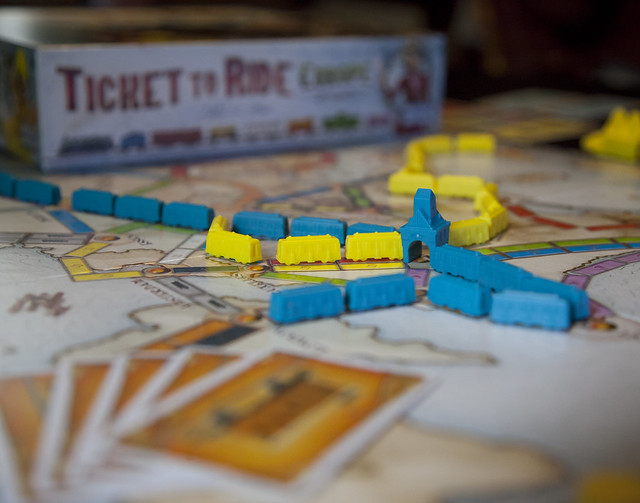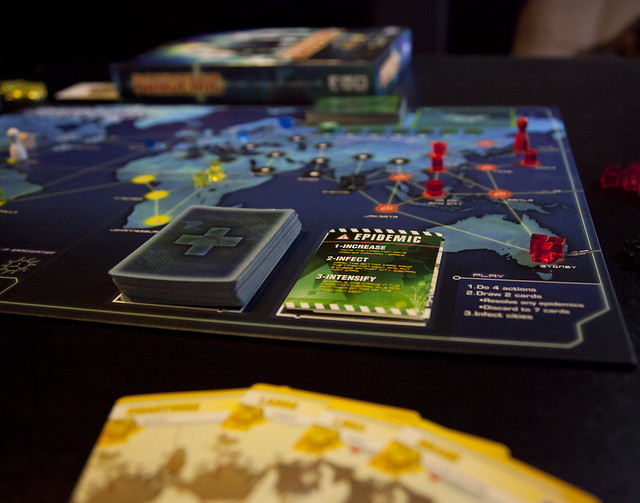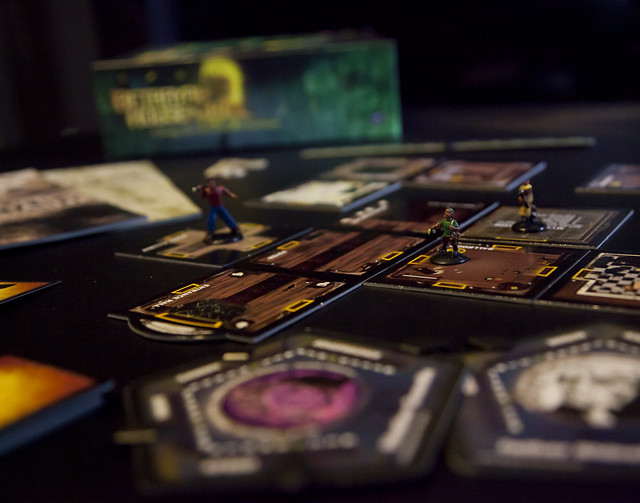I didn't realize it before, but the world of tabletop games is... extensive. Extensive and pretty impressive.
Unlike video games and computer games that become outdated so quickly, board games are timeless. Not only are they fun, but they offer lessons in values like honesty and cooperation, and they offer social interaction outside of the internet, which grows ever more important these days.
Of course, the habit can be expensive, so it's important to set limits on buying new games - but once you have them, you can start getting your money's worth. And you can continue getting your money's worth for years to come.
Four new games we've been playing lately have caught my interest in particular, so much so that they prompted me to write this post. They are Ticket to Ride, Pandemic, Betrayal at House on the Hill and Formula D.
Ticket to Ride
Pictured above, this family friendly game is mostly cards based, and is very easy to learn. You collect colored cards, and "claim" various color-coded train routes to earn points. You get additional points (or penalties) for completing (or not completing) train routes you select at the beginning of the game. You can earn bonus points for having the longest continuous route on the board. In the traditional version, the board is a map of North America. We bought the European version at our local Slackers. We should just pretend we're British...
Pandemic
Probably my favorite of our recent acquisitions, Pandemic is a cooperative game where you and your friends play against the game itself in an effort to stop the spread of four lethal diseases across the globe. Each player draws a "role," each with its own "special actions" to aid you in the fight. Each turn, a player makes four actions, then spreads the infection. If a dreaded epidemic card is drawn, diseases spread and intensify even further. Every infected city that already holds three disease cubes is ripe for an outbreak, which spells disaster. Eight outbreaks, and you lose. If any one disease is so rampant you run out of cubes, you lose. If you run out of cards in the player deck, you lose. The only way to win is to draw cards, match five cards of each color and cure every disease before the diseases win. You can control the effort level of the game by adjusting the amount of epidemic cards in your player deck, from 2 (easy) to 6 (legendary). It's amazing. I can't stress that enough. We've even named the diseases - zombie plague (black), rabies (blue), super AIDS (red) and yellow fever (yellow).
Betrayal at House on the Hill
The first game we purchased, Betrayal, is part co-op/part adventure game. Players choose a character that has two physical and two mental stats, and start on a board that consists only of a three-tile foyer, one upstairs landing and one basement landing. As players explore through doors that seemingly lead to nowhere, they draw rooms from the tile deck and build out the house. Some tiles have symbols on them that prompt an item, event or omen in game play. Items set players up for the haunt, which occurs later in the game. Events, like bleeding walls and disembodied voices, help/hurt a player's stats through dice rolls. Omens can do either, but serve an even larger purpose. Every time an omen is drawn, a player must make a haunt roll. If the dice add up to less than the amount of omens that have been drawn so far in the game, exploration continues. If the dice total is equal or more than the omen total, the haunt begins. The "haunt" is one of 50 horror film-like scenarios that usually pit one player, the "traitor," against the rest of the players for the final win. So far, we have played three times, with three different scenarios, and I have been found the "traitor" all three times. Still, I can't wait to see what the other 47 haunts involve.
David's brother Brian bought this game, but we still get to reap the benefits. Normally, I'm not into racing, but this game is awesome. Up to 10 players can race at one time, in basic mode, or advanced mode. In basic mode, players control a stick shift and roll various-sided dice to move around the track. Around each corner, players are required to make a certain number of stops or risk taking damage to their cars (or even spinning out). In advanced mode, characters' back stories kick in, and damage is much more specific. This one's kind of a no brainer, and is a lot of fun switching back and forth between dice.
If you're interested in learning about these games and more, visit www.boardgamegeek.com or watch Wil Wheaton and friends play some of the games each week on Geek and Sundry's "Tabletop" or on YouTube.




No comments:
Post a Comment